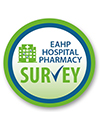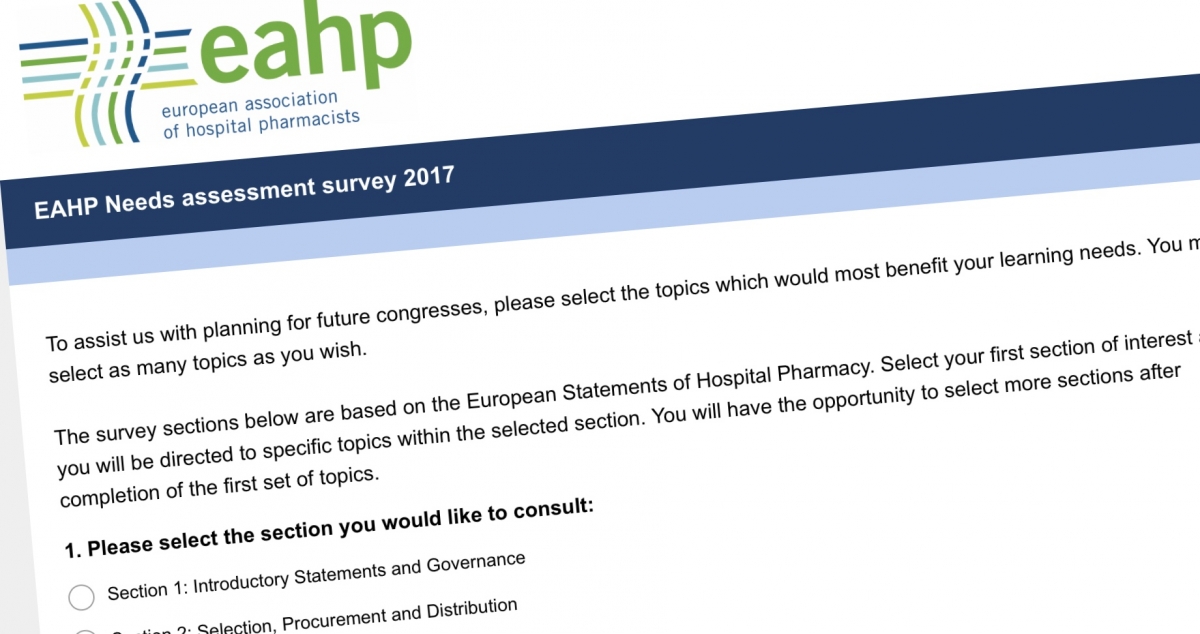 The EAHP EU Monitor is a regular round up of news relevant to hospital pharmacy in Europe.
The EAHP EU Monitor is a regular round up of news relevant to hospital pharmacy in Europe.
You can subscribe to receive the EAHP EU Monitor by email HERE.

2016 EAHP Statement Survey – results are available
The European Association of Hospital Pharmacists (EAHP) recently published the result of its 2016 statement survey. Together with the 2015 baseline survey and the 2015 statement survey, this publication now concludes the first cycle of the surveys of practice.
The surveys of practice aim at assisting the implementation of the European Statements of Hospital Pharmacy by providing the latest insights into the extent to which their vision for hospital pharmacy is being realized across EAHP’s 35 member countries. Data gathered per country via the surveys of practice helps to inform EAHP members, the board, the implementation team as well as the project team about the overall status quo of the profession and the Statement implementation status. In addition, these surveys help to identify barriers of implementation.
The 2016 statement survey focused on Sections 1 (Governance), 3 (Production and Compounding) and 4 (Clinical Pharmacy services) of the European Statements of Hospital Pharmacy.
Production and compounding is the area that currently poses the lowest implementation barriers to hospital pharmacists, while the following five questions yielded the least positive results:
- The pharmacists in our hospital enter all medicines used onto the patient’s medical record on admission (Section 4.4);
- The pharmacists in our hospital contribute to the transfer of information about medicines when patients move between and within healthcare settings (Section 4.5);
- Do you have an agreed strategic plan for the development of clinical pharmacy services in your hospital? (Section 4.8);
- The pharmacists in our hospital work routinely as part of multidisciplinary team (Section 1.1);
- The pharmacists in our hospital ensure patients and carers are offered information about their medicines in terms they can understand (Section 4.6).
Find the results of the survey HERE
Find more information about the European Statements of Hospital Pharmacy HERE

New EU rules for medical and in-vitro diagnostic devices approved
Medical devices include a wide array of products ranging from simple plasters to prostheses or pacemakers. They play a central role in maintaining health and quality of life of the population. However, unlike medicinal substances, medical devices do not need a pre-market authorisation before being placed on the market. Instead, medium and high-risk devices need to pass a conformity assessment, performed by an independent third party, called a “notified body”.
EU legislation which regulated these devices, approved in the 1990s, was no longer in line with the latest technological advancements. In addition, diverging interpretation of the existing Directive by Member States as well as the traceability of the products posed problematic.
Therefore, in 2012, the European Commission decided to address these issues by modifying the existing laws. As a first step a public consultation was launched, based on which the amendments to the current legislation should be determined. To ensure a uniform application throughout the Union, it was decided to replace the existing Directives on medical devices and in vitro diagnostic devices by Regulations.
The texts of the two Regulations, approved by the European Parliament focus on the following aspects:
- Widening and clarifying the scope of the legislation, including for example, aesthetic implants and medical software;
- Ensuring a closer supervision of the notified bodies by the national authority;
- Offering more responsibility and authority to the assessment bodies, including regular checks on manufacturers and thorough testing;
- Clarifying the rights and obligations of the parties involved in the supply chain, covering also internet sales and diagnostic services;
- Ensuring transparency to patients and healthcare professionals through a database (EUDAMED) containing comprehensive information about the devices available on the EU Market;
- Introducing a Unique Device Identification system (UDI system) to ensure post-marketing surveillance and traceability;
- Implementing stricter requirements for clinical evidence;
- Adapting the safety and performance requirements to new health technologies;
- Enhancing coordination between national surveillance authorities and aligning to international guidelines to facilitate trade.
The upcoming step is the implementation of the legislation, which would be a gradual process ranging from 3 years for medical devices to 5 years for in-vitro diagnostic devices. Directorate-General Internal Market, Industry, Entrepreneurship and SMEs (DG GROW) is in charge of implementing the UDI system. This task will be carried out with the aid of an EU expert group on UDI that will assist in preparing regulatory acts/guidance related to UDI implementation.
Both Regulations are planned to be published in the Official Journal of the European Union on 5th May 2017.
Find the fully approved text for medical devices HERE and the one for in-vitro diagnostic devices HERE
Further information is available HERE
WHO launches Global Patient Safety Challenge on Medication Safety

The World Health Organisation (WHO) has recently launched a new global initiative – the Global Patient Safety Challenge on Medication Safety – seeking to halve medication-related errors over the next 5 years.
Mistakes in ordering, prescribing, dispensing, preparing, administering or consuming the wrong medicine can be made by both health workers and patients. Such mistakes could however be avoided through systems and procedures which ensure that the right patient receives the right medication at the right dose via the right route at the right time. Thus, the WHO initiative calls on countries to take early priority action addressing system failures in the way care is organized and coordinated.
Actions taken as part of the Global Patient Safety Challenge on Medication Safety will be focused on the following four areas:
- patients and the public;
- health care professionals;
- medicines as products; and
- systems and practices of medication.
The Global Patient Safety Challenge on Medication Safety seeks to improve the way medicines are prescribed, distributed and consumed, and to increase awareness among patients about the risks associated with the improper use of medication.
More information on the initiative is available HERE
 EJHP: Physicochemical stability of voriconazole in elastomeric devices
EJHP: Physicochemical stability of voriconazole in elastomeric devices
The online first edition of the European Journal of Hospital Pharmacy (EJHP) has published an article evaluating the physicochemical stability of voriconazole in elastomeric devices. The findings of the publication indicate the possibility of early hospital discharge when using elastomeric intravenous administration of voriconazole in patients in whom oral route of administration is not available.
The article is available HERE
————————————————————–
 Commission consultation on AMR
Commission consultation on AMR
The European Commission seek stakeholder input for a new 5-year European Union (EU) Action Plan to tackle antimicrobial resistance (AMR).
Deadline for reply 28th April 2017
See EAHP EU Monitor 2 February 2017 for more information.
Consultation HERE.
OECD consultation on sustainable access to innovative therapies
The consultation is part of a new initiative to promote an international and high-level dialogue between stakeholders on access to innovative pharmaceuticals and sustainability of pharmaceutical spending that was endorsed by OECD member countries and by Health Ministers at the G7 Health Ministerial meeting in Kobe, on 11-12 September 2016.
Deadline for reply 1st May 2017
Consultation HERE.
Consultation on the experience with the European Professional Card
One year after its introduction, the European Commission seeks to gather views on the first experiences with the European Professional Card. The results of the consultation will feed into the evaluation of the initiative and could potentially be used as base for future actions.
Deadline for reply 3rd May 2017
Consultation HERE.

Needs Assessment Survey
Help EAHP plan for its next congress by filling in the needs assessment survey.
The survey is available HERE























 The EAHP EU Monitor is a regular round up of news relevant to hospital pharmacy in Europe.
The EAHP EU Monitor is a regular round up of news relevant to hospital pharmacy in Europe.


 EJHP: Physicochemical stability of voriconazole in elastomeric devices
EJHP: Physicochemical stability of voriconazole in elastomeric devices Commission consultation on AMR
Commission consultation on AMR 

